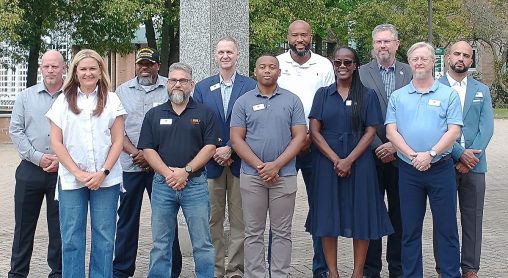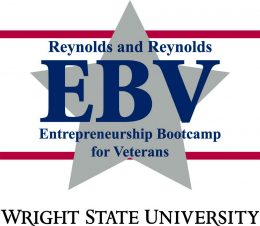
The first cohort in the Reynolds and Reynolds Entrepreneurship Bootcamp for Veterans is participating in a residential camp Aug. 5–12 at Wright State’s Raj Soin College of Business.
A group of veterans is spending the week at Wright State University learning how to turn their business ideas into reality during a special entrepreneurship program.
Hosted by Wright State’s Raj Soin College of Business, the inaugural Reynolds and Reynolds Entrepreneurship Bootcamp for Veterans welcomed 13 aspiring entrepreneurs for an intense eight-day training program to help them launch their businesses.
The veterans will receive a well-rounded, holistic introduction to the nuts and bolts of business ownership.
The program has a proven track record of success, said Elizabeth Harding, program manager of Wright State’s Entrepreneurship Bootcamp for Veterans. Almost 80% of program participants have started a business, and of those, more than 90% are still in business today.
“It gives veterans the tools that they need to truly be successful when they start their own business,” she said. “And not a lot of people have those tools when they go into it. It’s incredibly worthwhile, and it is a proven track record of what it tries to do.”
A $3 million gift from the Reynolds and Reynolds Company created an endowment to permanently underwrite the costs of Wright State’s Entrepreneurship Bootcamp for Veterans (EBV).
The program is part of a larger consortium of higher education institutions, initiated by the Institute for Veterans and Military Families at Syracuse University. The consortium includes Texas A&M, UCLA, the University of Connecticut, Louisiana State University, Florida State University, Saint Joseph’s University and the University of Missouri.
The consortium provides a variety of training programs for veteran entrepreneurs including those who have no business experience to business owners who want to take their company to the next level.
“If a veteran is interested but not ready yet, they can get there,” Harding said. “There are all sorts of trainings available to help them prepare for EVB.”
Wright State’s Entrepreneurship Bootcamp for Veterans program is geared toward veterans who have an idea for a business and those whose business is in its early stages and needs help finding success.
“They have that idea, they know what they want to do, they’re just not sure how to do it,” Harding said.
The program consists of three phases, starting with a 30-day online course on basic business concepts and entrepreneurship fundamentals, followed by the in-person camp and a year of mentorship with an experienced entrepreneur.
 The residential camp is hosted annually by the Raj Soin College of Business in Rike Hall and includes travel, food, accommodations, curriculum, resources and entertainment at no cost to veterans.
The residential camp is hosted annually by the Raj Soin College of Business in Rike Hall and includes travel, food, accommodations, curriculum, resources and entertainment at no cost to veterans.
This year’s residency phase takes place Aug. 5–12 and includes 13 veterans from around the country. In future years, Harding hopes to increase the cohort to 20 to 25 entrepreneurs.
The residency program focuses on the topics of accounting and finance, human resources, marketing, management, leadership and legal issues. The program is taught by entrepreneurs, business experts, veterans who have gone through the program and faculty in Wright State’s Raj Soin College of Business who support small business development.
Most of the program is held in Rike Hall. The veterans will also meet with other entrepreneurs at the Hub in downtown Dayton and visit the National Museum of the United States Air Force and Reynolds and Reynolds.
Veterans will also work one-on-one with a mentor to create a one-month, six-month and 12-month business plan. The mentors are all volunteers, many of whom are from Reynolds and Reynolds and Texas A&M’s program and local veterans who have completed the program.
The residential camp culminates with a graduate gallery in which each veteran displays a poster board that tells the story of their business concisely and compellingly.
After completing the residency, graduates receive 12 months of support, focused on small business creation and growth, led by a personal mentor. They also receive access to a broad array of resources related to such things as market research, trademark rules, certification resources and legal support resources.
The Entrepreneurship Bootcamp for Veterans consortium uses a centralized rolling application, which is managed by Syracuse University, and veterans can apply for the program at any time.
Post-9/11 veterans with honorable discharge are eligible to apply for the program. Applicants can live anywhere in the country and do not have to be enrolled as a student to participate in the camp.

 Gov. DeWine reappoints Board Treasurer Beth Ferris and names student Ella Vaught to Wright State Board of Trustees
Gov. DeWine reappoints Board Treasurer Beth Ferris and names student Ella Vaught to Wright State Board of Trustees  Joe Gruenberg’s 40-Year support for Wright State celebrated with Honorary Alumnus Award
Joe Gruenberg’s 40-Year support for Wright State celebrated with Honorary Alumnus Award  Wright State’s elementary education program earns A+ rating for math teacher training
Wright State’s elementary education program earns A+ rating for math teacher training  Wright State’s Calamityville hosts its largest joint medical training operation
Wright State’s Calamityville hosts its largest joint medical training operation  Wright State University launches Strategic Plan 2030 to advance student success, enhance role as regional economic driver
Wright State University launches Strategic Plan 2030 to advance student success, enhance role as regional economic driver 